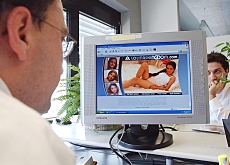Online contacts leave children vulnerable

A Swiss crime prevention specialist says parents are often unaware of the potential dangers their children face who reveal personal information in internet chat rooms.
Martin Boess admits that current prevention campaigns against paedophile crime lag behind changed habits of internet users.
There are numerous examples of youths who have been contacted by paedophiles according to Boess, who heads the coordination centre, Swiss Crime Prevention (SCP).
“We often get calls from parents who look for advice because their underage daughter has arranged an appointment with an elderly man she met over the internet.”
These are clear indications that there are activities on the internet which should be banned, according to Boess.
“A law is in force but it is difficult to evaluate the electronic traffic. There are court rulings we are unhappy about and society as a whole can not be happy about,” he says.
Boess argues that law must be enforced and he criticises a ruling that chat room dialogues on sexual matters between adults and minors are not punishable crimes.
“Adults who engage in such online conversations are not subject to prosecution and that is absolutely incorrect. But we are convinced that it undermines prevention efforts. Therefore this has to stop,” Boess said.
Strangers
Teenagers are talking to people more or less familiar to them when they use instant messaging services or emails. But it is different with chat rooms where users hardly know each other or are strangers.
“There lies the great danger,” says Boess. One in two youths have tried chat rooms. They exchange personal data, including addresses and phone numbers, but people are also harassed or even physically attacked when they meet face to face.
Prevention experts try to raise awareness of the dangers in special campaigns for children and teenagers. In cooperation with other countries the authorities offer films on the internet and leaflets with football stars warning of the risks of giving away personal information.
Boess says most parents send emails and use online search engines but they have no idea what their children use the internet for.
“Parents should be guides for their children on the internet and warn them of the potential dangers.”
It is a task made difficult if parents have no idea of the possibilities of the worldwide web.
Learning from children
Children and teenagers generally find it easy to learn new technologies and many of them are not only consumers but are regular contributors producing pictures, videos, music files or writing texts for blogs.
“It doesn’t matter if parents are not necessarily up to date on the latest technologies. They can ask their children to show them,” says Boess.
But he admits that prevention efforts are rather powerless and awkward in the face of the dangers of active contributors.
The big challenge is to find a way to reach those teenagers and pass our message on to them.
“We have to reconsider our strategy; things moved so fast that we could hardly keep up,” said Boess.
It is no longer good enough to tell teenagers not to give away any personal information online.
“You have to reveal as much as possible of yourself to find like-minded people and friends on the internet and be able to contribute to the content,” he added.
swissinfo, based on an article in German by Etienne Strebel
A 2007 survey from neighbouring Germany shows that households with teenagers used the following electronic media: mobile phone (100%), TV (99%), computer (98%), CD player (97%), MP3 player/i-pod (93%).
94% of the respondents said they owned a mobile phone, 67% said they had a computer or TV. 45% said they had internet access in their own rooms.
Boys and girls use the media differently (in %). Instant messaging (68/75), email (61/58), listening to music (41/56), chatting (30/30), watching videos (11/28), games (4/24), music downloads (7/16).
There is no data about Switzerland, but the situation is similar to that in Germany, experts say.
Swiss Crime Prevention (SCP) coordinates the prevention work of the various Swiss cantonal police forces.
SCP has been running a campaign against paedophile crime on the internet since 2005.
The key messages of SCP’s campaign against child pornography is that the police is also present online. People who view images of child abuse leave traces, which can be investigated by the police.

In compliance with the JTI standards
More: SWI swissinfo.ch certified by the Journalism Trust Initiative











You can find an overview of ongoing debates with our journalists here . Please join us!
If you want to start a conversation about a topic raised in this article or want to report factual errors, email us at english@swissinfo.ch.